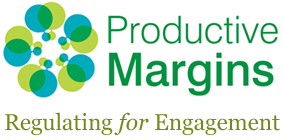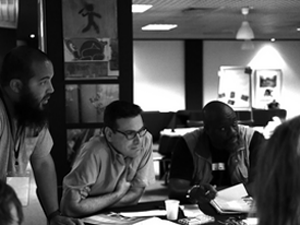The Forum is not a conventional advisory board, nor does it follow a familiar model of partnership dominated by powerful actors. Rather it is itself a site of experimentation, acting as a dynamic location for co-producing knowledges, enhancing exchange and dissemination, and developing innovative methods for the social sciences, arts and humanities.
Principles
Academics and community organisations are equal partners in the design and delivery of the research programme.
New understandings arise when we reflect what we think we know against others who bring to the field different perspectives.
Forum: April 2013, Graduate School of Education, University of Bristol
Making the forum work for us all
This was the first time the group had met together and many were meeting for the first time. As part of the process of introduction, each participant brought an object or photo/image that they felt spoke in some way of the community they represent or to which they belong.
The was an interesting discussion on : How do we ensure that the Research Forum works for all of us, furthers communication and record keeping, and is based on values of trust and mutual respect?
Download report of first meeeting (PDF, 203kB).
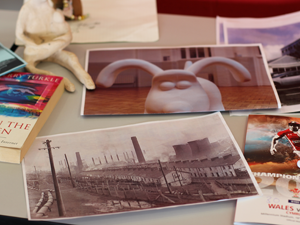 Forum: June 2013, Merthyr Tydfil, 3Gs Development Trust
Forum: June 2013, Merthyr Tydfil, 3Gs Development Trust
Maps and other innovative methods
The day began by immersing us in the history and stories of the South Wales Valleys. The creative and physical element of the mapping exercise served to generate discussion, draw distinctions and similarities between different locations, explore personal narratives and experience the co-production of something new.
Tensions arose surrounding issues of roles, resources and governance. This was to be expected and it was a test of the strength of the forum as it appeared to operate with a genuine openness that allowed conflicting perspectives to be voiced and debated.
Download report of second meeting (PDF, 3MB).
 Forum: October 2013, Knowle West Media Centre
Forum: October 2013, Knowle West Media Centre
This was a day filled with presentations, walks in the community, exercises and discussion of research themes and questions and insightful artist jotting.
Download report of third meeting (PDF, 2MB).
Forum: December 2013, SPAN, Easton, Bristol
Today saw emerging research themes and evaluation of the forum process.
Download report of fourth meeting (PDF, 2MB).
Forum: May, 2014, SCDA, Bristol
The Challenge: To foster a sense of responsibility-in-common so that we collectively develop the themes, identified in the previous forum, into draft research proposals, with clearly identified questions, methods and possible outcomes.
Download report of fifth meeting (PDF, 2MB).
Forum: January 2015, Cardiff University
The aim of this Forum was to focus on the arts within the Productive Margins programme.
Download report of sixth meeting (PDF, 65kB).
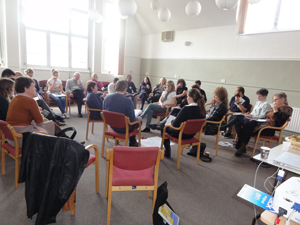 Forum: March, 2015, University of Bristol
Forum: March, 2015, University of Bristol
I cannot think for others or without others, nor can others think for me
What role does pedagogy – the method and practice of teaching & learning – have in co-produced research? How can we ensure that everyone involved with a large project has an opportunity to contribute and to have their input valued?
The aim of this day was to allow each participant to step outside of his/her usual role within Productive Margins, to see the project from other perspectives and draw on other ways of knowing.
Participants were asked to exchange the roles they usually represent in the programme and take on within the forums, and to reflect on what and how they have learned in previous Forum events since April 2013.
Download report of seventh meeting (PDF, 7MB).
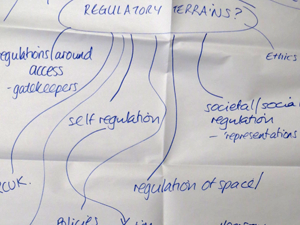 Forum: February 2016 KWMC, Bristol
Forum: February 2016 KWMC, Bristol
The aim of the morning sessions was to reflect on what we have learnt so far about co-production and about regulation.
In the afternoon we focused on the planning of future outputs, commitments and final research projects.
Download report of eighth meeting (PDF, 2MB).
What do you think? Was this interesting? Useful? Tell us why… email productive-margins@bristol.ac.uk
